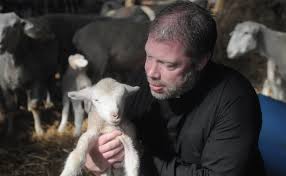A shepherd’s duty is to respond to all
In John 10:4, Jesus tells us that a sheep knows his master's voice and responds accordingly. That should tell us as much, if not more, about the shepherd as it does about the sheep.
Aug 26, 2015

By Mike Nelson
In John 10:4, Jesus tells us that a sheep knows his master's voice and responds accordingly. That should tell us as much, if not more, about the shepherd as it does about the sheep.
Most of us are called to be shepherds of some sort. Take the workplace, for example. There are all kinds of leaders, or shepherds. I have worked for some good leaders and a couple who are best not to mention at all. Those who were good leaders -- those whose voices I would respond most willingly and enthusiastically to -- were those who genuinely cared about the individuals in their charge.
That doesn't mean a leader does whatever his "sheep" want him to do. A shepherd's sheep, for example, might be just as happy lounging in the barn all day long or perfectly content hanging out in the pasture.
Not being any sort of sheep whisperer, I wouldn't know, but I suspect that sheep instinctively obey their shepherd because they sense the shepherd has their safety and welfare uppermost in mind.
That is the sort of workplace leader I've tried to be, when called upon -- one who cared, above all else, about the personal welfare of his staff (most of whom had personalities far more complex than sheep). Yes, there were goals that we all strived to achieve, but to me those were secondary to keeping my people (at least reasonably) happy.
Some would say that's not a very smart way to run things or a very admirable trait in a leader. In the working world, you can get into trouble if you let personal feelings get in the way of the good of the business.
My reply is that a leader who shows care and concern for his charges' welfare while keeping everyone aware of and dedicated to fulfilling the institutional goal and purpose (what many today call the mission) is more likely to draw support and loyalty, and better results, from those he leads.
And when we talk about mission, it might be worth considering what sort of worthwhile mission does not take into account the welfare of those employed to fulfill it?
But Jesus further suggests (in Luke 15: 4-7) that a good shepherd not only is concerned for each member of the flock but will search high and low to find the one that is lost or gone astray.
I recall vividly the opening address of Encuentro 2000 in Los Angeles by Vietnamese Archbishop (later Cardinal) Francois-Xavier Nguyen Van Thuan, then president of the Pontifical Council for Justice and Peace, alluding to this very point.
"Jesus," the archbishop smiled, "is no good at math. He thinks one equals 99, perhaps even more."
That's an interesting concept for those who lead -- whether they lead a team, a classroom, a department, a corporation, a family or a ministry. What about that one who goes astray? Do we forget about him? Cut our losses and move on?
We shouldn't accept that thinking. We can't accept that some people are not worth the trouble, that some should be written off, left behind and ultimately forgotten. I don't believe God works that way, and we shouldn't either.
Everyone has value, everyone has God-given life and dignity -- and a good shepherd, in any capacity in the church, knows this.
A good shepherd, Jesus says, does not give up on those who are lost and strayed, whether in body or in spirit. A good shepherd searches, endlessly if necessary, in hope that the lost will be found, or will return. And when the lost are found, a good shepherd rejoices.
That does not mean he loves the rest of his flock any less -- something the prodigal son's brother no doubt struggled to accept. A good shepherd has love enough for everyone. That is why those of us who truly know his voice believe, and follow.







Total Comments:0